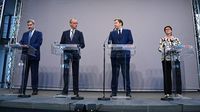On April 9, 2025, the leaders of the CDU, CSU, and SPD presented the draft of a new coalition agreement in Berlin, marking a significant step towards forming a new government. The coalition agreement, which is still pending approval from the respective parties, outlines key policies and objectives for the upcoming legislative term.
During a joint press conference, CDU leader Friedrich Merz emphasized the importance of the coalition, stating, "This agreement is a strong signal to the citizens and to Europe." He expressed confidence that the new federal government could begin its work by early May, following the expected election of Merz as Chancellor. The coalition aims to address pressing national issues, including economic recovery and migration policy.
As part of the coalition agreement, the SPD will receive seven ministries, including the crucial Finance and Defense ministries, while the CDU will fill six ministries, such as the Foreign Ministry for the first time in nearly 60 years. The CSU will oversee three ministries, including the powerful Interior Ministry. This distribution reflects a balanced approach to governance, with each party retaining significant influence.
One of the notable features of the agreement is the introduction of a new basic security measure, which will replace the current citizen income. SPD leader Lars Klingbeil stated that this change aims to ensure a strong social state while increasing pressure on individuals who are unwilling to work. The agreement also includes plans to tighten current benefits for Ukrainian refugees, who will receive reduced assistance compared to other asylum seekers.
In terms of economic policy, the coalition intends to lower the corporate tax rate gradually, starting in 2026, and implement new depreciation options for businesses. Additionally, the electricity tax will be reduced to a European minimum, and an industrial electricity price will be introduced to support energy-intensive companies. These measures are designed to stimulate economic growth and provide relief to both businesses and consumers.
Furthermore, the coalition has pledged to abolish the controversial heating law and replace it with a more flexible and technology-neutral building energy law. This decision reflects a commitment to modernizing Germany's energy policies while addressing environmental concerns.
During the press conference, CSU leader Markus Söder referred to the coalition as a "Germany pact," highlighting the collaborative spirit among the parties. He expressed optimism about the agreement's potential to strengthen Germany's position in Europe and beyond.
However, not all reactions to the coalition agreement have been positive. Green party leader Felix Banaszak criticized the negotiated terms, labeling them as "Klamauk" and expressing concerns about the implications for environmental policy. This criticism underscores the challenges the new coalition may face in balancing diverse political perspectives.
In terms of social policy, the coalition has committed to extending the rent cap and promoting social housing initiatives. The minimum wage is set to increase to 15 euros, further supporting low-income workers. Additionally, the pension level will be secured at 48 percent until 2031, with measures in place to ensure financial stability for retirees.
Looking ahead, the coalition also aims to introduce a new and initially voluntary military service model. Merz noted that this model would draw inspiration from Sweden, where young citizens are contacted for potential military service. This approach reflects a shift towards a more flexible military structure in Germany, moving away from mandatory conscription.
The coalition agreement, which spans 146 pages, is expected to be a comprehensive document detailing the parties' plans for the next legislative period. It includes provisions for various sectors, such as education, climate, and migration, demonstrating a holistic approach to governance.
As the parties prepare for internal votes on the agreement, SPD leader Klingbeil emphasized the importance of creating space for project agreements through savings. He acknowledged that many aspects of the agreement are contingent on future financing, indicating a cautious but optimistic outlook for the coalition's implementation.
In conclusion, the coalition agreement between the CDU, CSU, and SPD represents a significant step forward for German politics. With a focus on economic recovery, social security, and migration reform, the coalition aims to address the pressing challenges facing the nation. As the parties work towards finalizing the agreement and preparing for the election of the new Chancellor, the landscape of German governance is poised for change.









